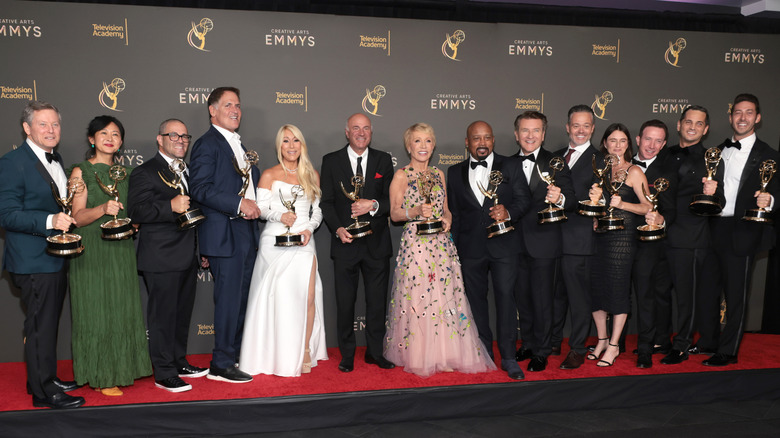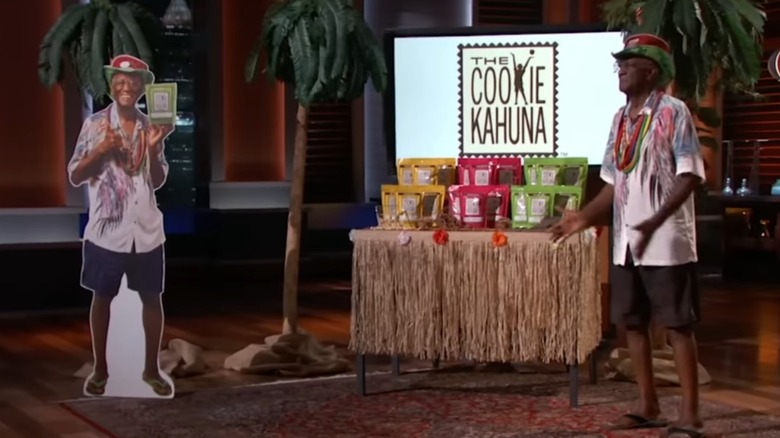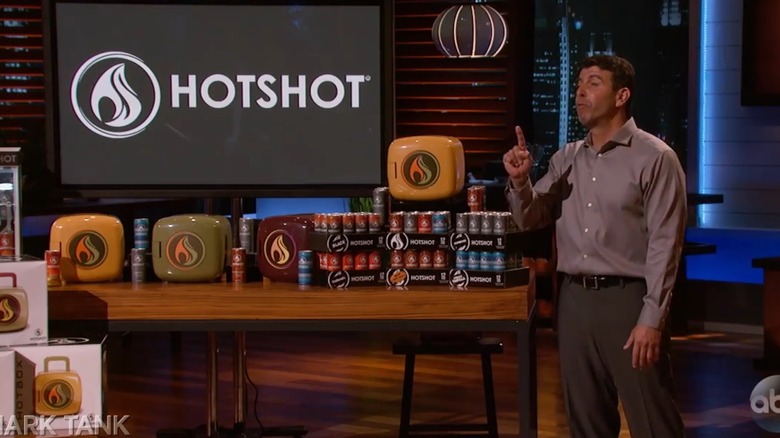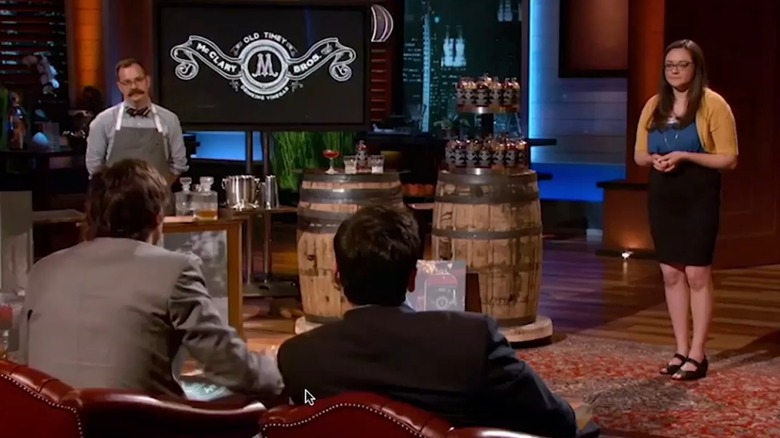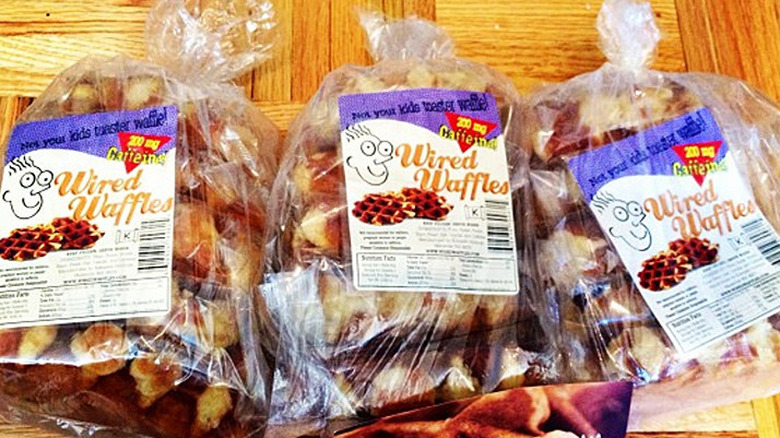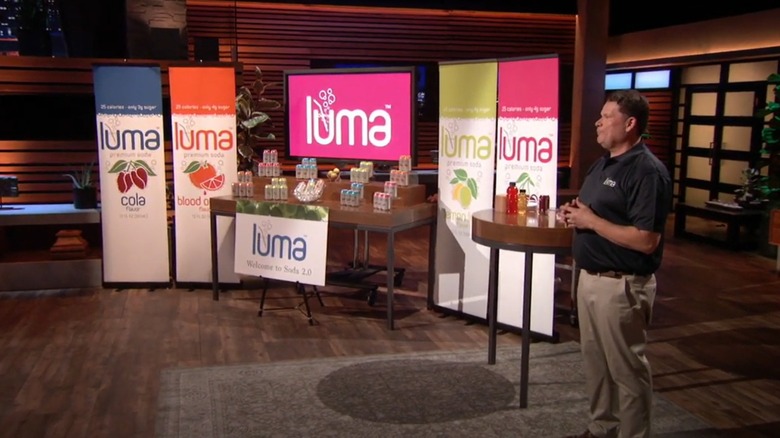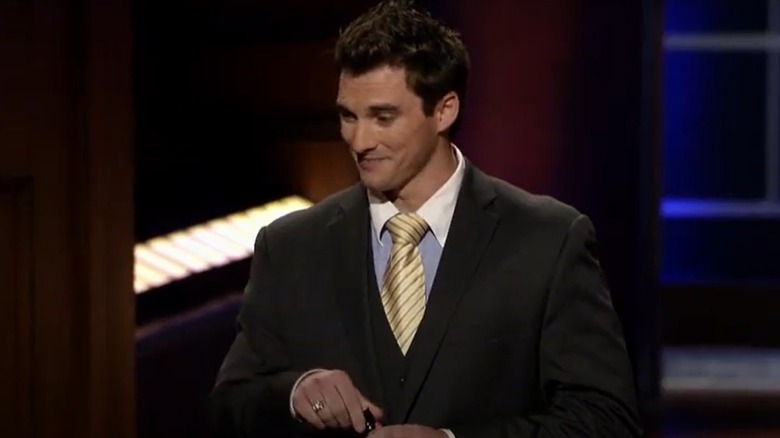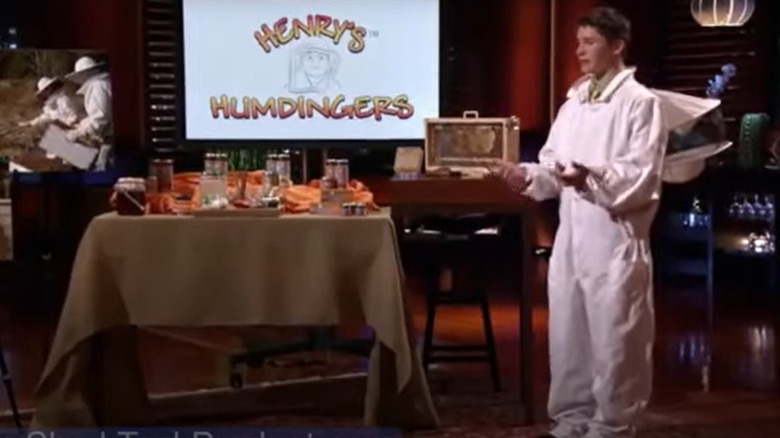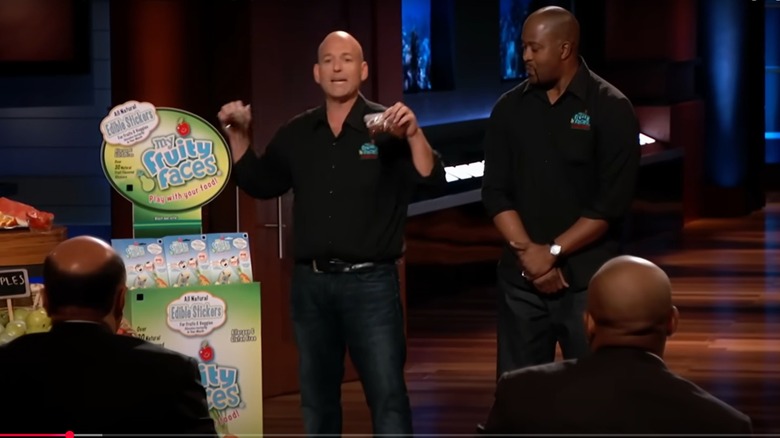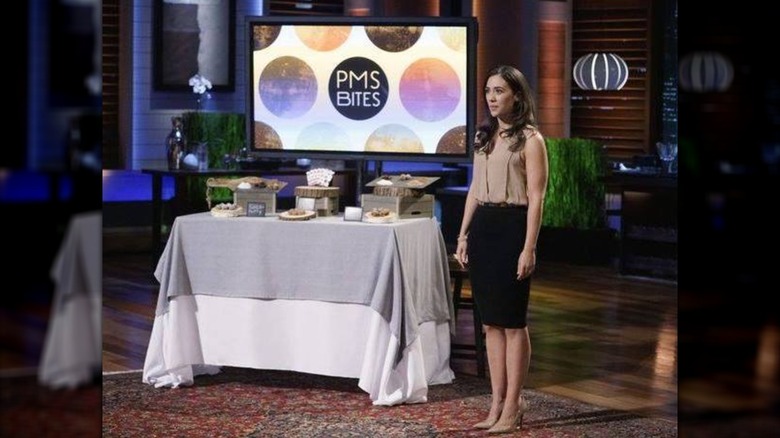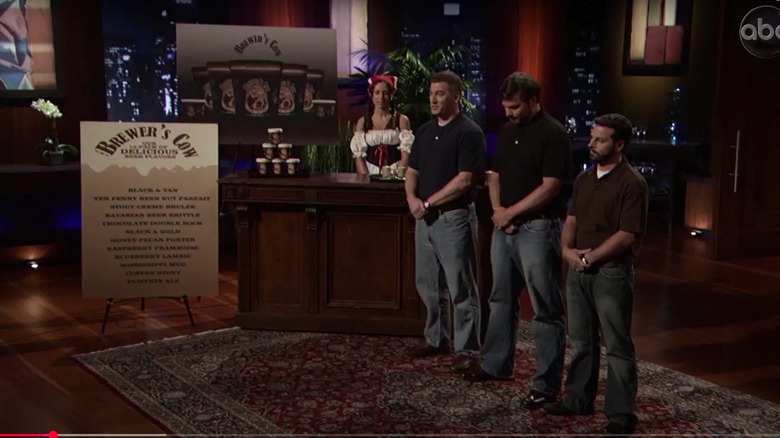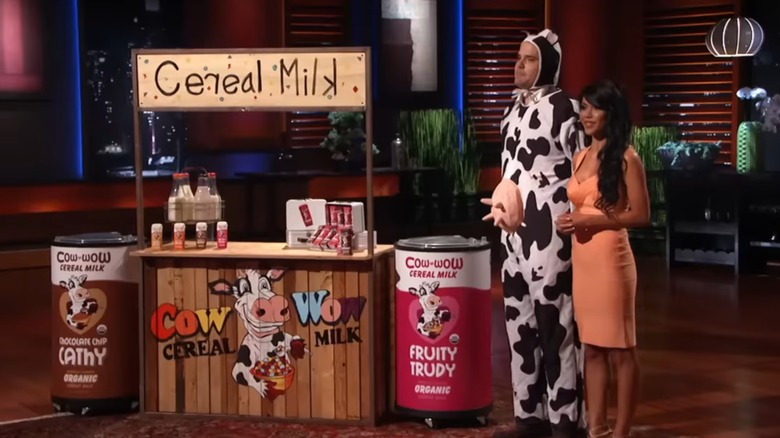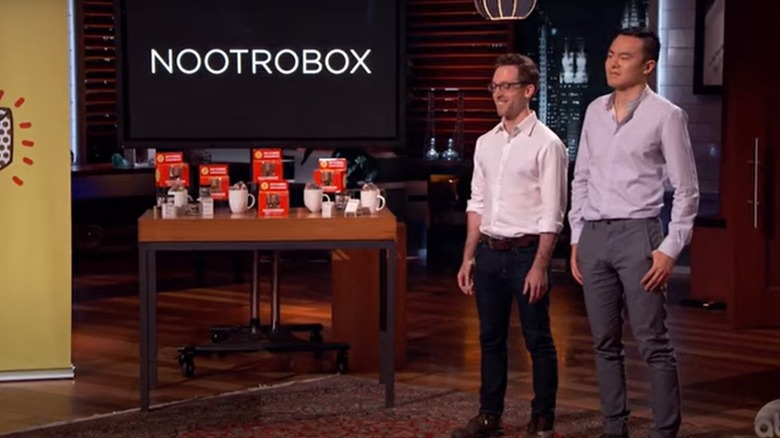The Biggest Food Flops In Shark Tank History
"Shark Tank" — the series where people pitch ideas and inventions to a panel of successful and wealthy businesspeople — is one of the most popular reality television shows. Premiering on ABC in 2009, the show was based on the Japanese program "Tigers of Money" and the U.K.'s "Dragons' Den." It was an instant hit with American audiences, and has since made millionaires out of many newbie entrepreneurs.
Several food products, such as Wicked Good Cupcakes and Cousins Maine Lobster, have led to deals with one or more Sharks and grown into highly successful businesses. Of course, not every person who pitches gets a deal. The Sharks are investing real money, so they are cautious and use every ounce of their considerable business savvy when deciding whether to make an offer.
According to StartupBooted, more than 60% of people who pitch on the show walk out with a deal, which leaves nearly 40% exiting empty-handed. Some fail spectacularly, and less than 50% of those who do make a deal see it finalized. If you are a long-time fan, you may wonder, whatever happened to beer blizzard, for example. Let's take a look at some of the food pitches that flopped and failed to impress the Sharks over the years.
Cookie Kahuna
Wally Amos of chocolate chip cookie fame is a guy who knows a thing or two about the ups and downs of building a company. In 1975, Amos started selling his Famous Amos cookies in a store on Sunset Boulevard in LA. Using his image as well as his name in marketing, Amos netted $300,000 in sales his first year and made $12 million by 1982. Unfortunately, Amos was not as good a businessman as he was a marketer, and three years later, he experienced a $300,000 loss against $10 million in sales. He sold the company for $1.1 million to Bass Brothers Enterprises, which moved it on to the President Baking Company in 1992 for $61 million.
Amos decided to get back into the cookie business a couple of decades later, and made a colorful pitch to the Sharks for Cookie Kahuna, his Hawaiian-themed home-baked cookies. The Sharks were not impressed by his meager $36,000 in sales, largely in Hawaii. Amos was also peddling his cookies online, but shipping and packing costs were a bit high for the Sharks' tastes, as they were eating into profits.
The final strike against Amos was that when he sold his original company, he also gave up the rights to his name and image. Without these vital marketing tools, none of the Sharks could see Cookie Kahuna as a viable investment, and Amos exited the tank without a single offer.
HotShot
The Japanese love automation, and that includes vending machines. Per Statista, as of 2023, the Asian nation has 3.93 million vending machines. These machines sell all kinds of products, chief among them hot and cold beverages. While on a 2009 visit to Japan, Danny Grossfeld noticed vending machines that sold coffee. This struck him as a great idea, and he felt it could be a big success in the U.S. No visiting a coffee shop, no waiting in line, no problem, just a nice hot coffee in seconds.
He developed his product, HotShot, canned coffee that is stored in a warm container at 140 degrees Fahrenheit. Grossfeld found his way into the tank to pitch the nation's first grab-and-go hot coffee. His pitch started well, as the Sharks enjoyed the flavor. Mark Cuban was concerned that the temperature would make the cans too hot to hold, but Grossfeld explained that they were well-insulated. Then things fell apart.
Despite spending $2 million over six years developing the product, Grossfeld had zero sales to date. That drove Kevin O'Leary out. Mark Cuban said he would test the product in his Landmark Theaters but was not interested in investing. He and the remaining Sharks declined to make an offer, leaving Grossfeld to walk out without a deal.
McClary Brothers Drinking Vinegar
Pretty much everyone has vinegar in their kitchen. It's useful for cooking and, in many cases, is the key to cleaning those pesky stains. But vinegar as a beverage? Once upon a time, it was quite popular in that capacity. Vinegar and sugar syrups called shrubs were popular drinks in Europe more than four centuries ago, and were thought to help prevent disease. The practice of drinking shrubs made its way to America, and the drink remained popular until the early 20th century.
The invention of cocktails, along with carbonated drinks and refrigeration, brought an end to vinegar drinks. Culinary school student, Jess Sanchez McClary, sought to bring back vinegar drinks and created McClary Brothers Drinking Vinegar, a drink mixer made with natural, local ingredients. It was intended to add flavor to sparkling water or create craft cocktails. McClary needed capital and expertise, and entered the tank to seek it.
After explaining the history of shrubs and the story of her product, McClary passed out samples. Opinions were mixed. Robert Herjavec drank his whole glass, but Mark Cuban thought his drink needed more gin. Lori Grenier liked the bourbon with the apple pie flavor, but overall, every Shark thought the vinegar taste was overpowering. Despite McClary making $312,000 in sales, the Sharks had doubts about the product's scalability and lack of research for its alleged health benefits. All five Sharks passed, and McClary left with a sour taste in her mouth.
Wired Waffles
There are ways to get caffeine without coffee, but who knows how many chocolate-covered espresso beans you'd have to eat? One would-be entrepreneur came up with a new way for people to get their morning buzz. Roger Sullivan developed a combination breakfast snack/energy drink called Wired Waffles. The waffle-like snacks contained the equivalent amount of caffeine as two cups of coffee. Sullivan pitched that they were a convenient way to get nutrition and caffeine in the morning. Interesting idea, but the Sharks were not impressed.
First, not one of the Sharks liked the taste. Robert Herjavec found Wired Waffles dry and unpleasant tasting. Mark Cuban got to the heart of the matter and asked Sullivan about sales, which were a paltry $1,000. Kevin O'Leary was concerned that there was nothing proprietary about the product, and Lori Grenier worried about the heavily caffeinated snacks getting into the hands of children. Sullivan did not endear himself to the Sharks when he told them that his children and his neighbor's kids all drank energy drinks. Grenier viewed this as a potential liability, and Sullivan departed with far less energy than he entered with, and not a single offer.
Luma Soda
Soda is an enormously popular drink, and diet versions have been around for decades, allowing people to enjoy a tasty carbonated beverage without excessive calories. Health concerns about sugar substitutes have led to soda companies seeking healthier ways to sweeten their drinks. Jim Otteson thought he had the solution with his soft drink, Luma Soda.
Formerly addicted to diet soda, Otteson developed cola, cherry cola, lemon-lime, and blood orange carbonated soft drinks that used monk fruit and honey for sweetness and only had 25 calories per serving. He had $180,000 in sales the past calendar year and eagerly presented Luma Soda in the tank. When the numbers were discussed, Otteson ran into problems. All of his sales were direct-to-consumer, and he did not have many repeat customers. A 12-pack of his soda had a retail price of $19.99, significantly higher than the brands found on supermarket shelves.
Lori Grenier didn't like the taste any more than the numbers and was the first one out. The other four Sharks quickly followed, and Otteson left without the sweet deal he came in seeking.
Cougar Energy Drink
Per Statista, in 2023, the revenue of energy drinks was $193 billion. People use them as meal substitutes or to get a quick boost when they hit the wall in the afternoon. It's an incredibly competitive market to enter, and Ryan Custer thought he had a winner with Cougar Energy Drink, a beverage that targets women aged 30 to 55. He eagerly entered the tank, but things could not have gone much worse.
The Sharks found his pitch amusing, and questioned his definition of a cougar. Custer told the Sharks that he had used all of his savings to work on developing his product over a three-and-a-half-year period, and was thus living with his parents. His sales-to-date figure of $60,000 further discouraged the Sharks. Barbara Corcoran didn't like the flavor, but it was Kevin O'Leary who struck the killing blow. He pointed out that the main market for energy drinks is young men, and by targeting such a specific group of females, Custer was eliminating 75% of potential customers. Herjavec labeled Cougar Energy Drinks a gag gift, and no Shark even considered making an offer. A deflated Custer exited the tank, feeling low energy. Too bad his drink is only for women.
Henry's Humdingers
Henry Miller is the youngest entrepreneur on our list. Just 16 years of age at the time of his appearance in the tank, he is also the only one who got an offer. An ambitious young man, Miller started keeping bees when he was 12. He soon had honey. Lots of honey. More honey than he knew what to do with. He came up with the idea for Henry's Humdingers, a line of spicy honeys in assorted flavors. In addition to selling honey, Miller also used his product to raise public awareness about the importance of bees to the environment.
Miller entered the tank with confidence and impressed the Sharks with his pitch. Working with his mother, he had gotten Henry's Humdingers into 300 stores across 30 states over the past four years. People who seek organic food are especially attracted to his raw honey product. Kevin O'Leary went out, feeling there was not a big enough market for the product, and Lori Grenier exited the negotiations for the same reason. Barbara Corcoran believed Miller was doing fine on his own and didn't need a Shark.
Mark Cuban said he would be interested if Robert Herjavec would do a deal with him. The duo offered $300,000 for a whopping 75% equity. Cuban and Herjavec would take charge of the growth and development while Miller collected his share. After mulling it over, Miller politely declined, unwilling to give away control of his family business.
Mr. Fruity Faces
Parents face the challenge of getting children to eat healthy snacks, such as underappreciated veggies packed with protein. With this in mind, Adam Gerber and Bob Ntoya developed Mr. Fruity Faces, edible stickers of funny faces flavored like various fruits and vegetables. The treats are gluten-free and have zero calories.
In the tank, a nervous Ntoya fumbled his lines during the start of the pitch, leading to a weak first impression. The duo recovered and told the Sharks that their product was already in stores and had $125,000 in sales over three years. Kevin O'Leary wanted recent sales numbers, and the Sharks were not impressed with the meager $2,000 figure over the past month. Ntoya countered with the fact that he and Gerber had just gotten a contract with Walmart that could put them in 3,600 stores. The Sharks were still not impressed, since despite the contract, Gerber and Ntoya had no purchase orders.
The Sharks felt that the idea wasn't bad, but the execution was deeply flawed. Mark Cuban advised them to move the inventory they had rather than seek out new contracts, and Kevin O'Leary felt they should abandon the product altogether. Unsurprisingly, not a single Shark made an offer, and Gerber and Ntoya left the tank empty-handed.
PMS Bites
Getting through PMS can be difficult for women. Low energy, mood swings, and cravings for sweets are just a few of the issues they must deal with. Tania Green spent several years keeping track of her mood during PMS, and found that despite exercising regularly, eating, and sleeping well, her mood still suffered and she craved unhealthy snacks. Denying herself just made her mood worse. Green decided to do something about it and created PMS Bites, a healthy chocolate snack that could satisfy women's cravings without blowing their diets.
Green eagerly pitched her product to the Sharks, who liked the taste and the way the snacks were packaged. Things started to unravel when they got into the numbers. A meager $13,400 in sales over a seven-month period failed to impress the Sharks. When Robert Herjavec asked why the number was so small, Green informed them that she did all the work. She made the snacks in a commercial kitchen and took care of the packaging, shipping, and marketing with no help.
Kevin O'Leary and Lori Grenier didn't like the name of the product and dropped out. Herjavec and Barbara Corcoran saw little growth potential and didn't feel that Green had what it took to grow a company, and both dropped out. Mark Cuban did not like Green's marketing approach, as she focused solely on retail and ignored the potential of social media. He dropped out, leaving her with no offers and no deal.
Brewer's Cow Ice Cream
Ice cream makers have come up with some wild flavors, but not even discontinued Ben & Jerry's flavors included beer. Could the popular beverage make for tasty ice cream? The trio of Steve Albert, Larry Blackwell, and Jason Conroy thought so. Using his 10 years of experience in ice cream manufacturing, Albert and his partners created Brewer's Cow, ice cream flavored with premium beers. With the alcohol removed, the ice cream had the taste of the beer without the intoxication. The partners headed into the tank looking for a deal.
Being lactose intolerant, Daymond John could not try the product and dropped out immediately. However, the other Sharks liked the flavor of Brewer's Cow and were intrigued. Things started to go south when the entrepreneurs were queried about their sales, which were a dismal $5,000.
Blackwell informed the Sharks of an order from Whole Foods, but the three partners gave conflicting answers on how much the supermarket chain ordered. The lack of knowledge concerning the numbers involved drove out the rest of the Sharks. Mark Cuban advised them to license their ice cream to a major brewery, and the pitch ended. Albert, Blackwell, and Conroy failed to impress the Sharks and did not land a deal.
Cow Wow Cereal Milk
According to Statista, 283.39 million people ate cold breakfast cereal across the nation in 2020, and that figure was projected to reach 290.32 million in 2024. That's a lot of cereal and a lot of milk left over in the bowl after finishing it. That milk generally has the flavor of the cereal and is delicious. Most people eagerly drink it rather than dispose of it, which got Chris Puoy and Tiffany Panhilason thinking. If people like the leftover milk, why not sell milk with the flavor of cereal? They created Cow Wow Cereal Milk, a dairy product that came in four different cereal flavors. With what they thought was a winner, they entered the shark tank seeking a deal.
The Sharks acknowledged that cereal milk is tasty and most people love it. Steve Tisch didn't like the taste and dropped out. The Sharks were not happy to learn that the sugar content was higher than that of regular milk — 20 grams as opposed to 14 per serving. Puoy and Panhilason told the Sharks that Cow Wow Cereal Milk was in Bristol Farms stores and some Albertsons. Despite this, Mark Cuban pointed out a problem. Big dairy companies already sell flavored milk, and the competition in this field would be massive. Kevin O'Leary saw their product as hopeless, and the remaining Sharks dropped out, leaving Cow Wow without an offer or a deal.
Go Cubes
Millions of people cannot get their day started without the jolt of caffeine they get from a good cup of coffee. Although caffeine is a stimulant, Michael Brandt and Geoffrey Woo thought they could take things a step or two further by creating a nootropic supplement. Their chewable coffee substitute, Go Cubes, contained the caffeine equivalent of three cups of coffee and was designed to improve focus, alertness, and mental clarity. Along with Go Cubes, the pair had several other nootropic supplements that aided in memory, sleep, and cognitive performance. Sounds pretty promising, right? Let's see what the Sharks thought.
To start, Brandt and Woo were seeking $200,000 for a mere 5% equity, a $40 million valuation, which at the time was the highest ever on the show. That number got things off on the wrong foot. The partners neglected to discuss the important sales and other numbers and continued talking about the science behind the product, which raised a red flag. Chris Sacca was concerned that the product might have negative effects on health long term, and he dropped out. Lori Grenier felt that Go Cubes was a pretty good idea, but the duo was not skilled enough as salesmen, and she was out. The high valuation and the partner's lack of business savvy drove out the remaining Sharks, and Go Cubes was a no-go in the tank.
